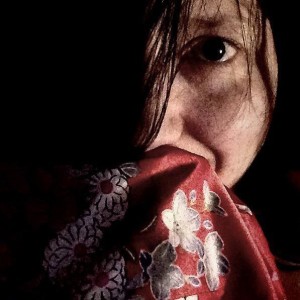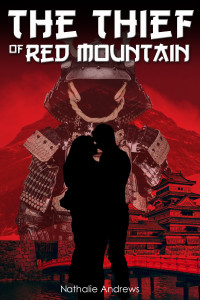Author Interview With Nathalie Andrews
 Today we have an interview with the lovely writer, Nathalie Andrews.
Today we have an interview with the lovely writer, Nathalie Andrews.
So, what exactly do you write?
I write historical fiction set in nineteenth century Japan. It’s been described as Game of Thrones with samurai.
I write historical fiction set in nineteenth century Japan. It’s been described as Game of Thrones with samurai.
How would you describe yourself in a short third person bio?
Quirky cat lady? I guess I define myself through the things I love: travel, writing, anime and manga, coffee and wine.
Quirky cat lady? I guess I define myself through the things I love: travel, writing, anime and manga, coffee and wine.
What made you initially want to write? Has your motivation changed since then?
It always sounds a bit pretentious, but I can’t not write. It’s most closely akin to hunger; I have to do it. So, for me, there has never been some outside goal, a particular point I want to make or a virtuous reason beyond my simply being me. I never showed my writing to anyone until I was well into my twenties when someone actually said to me “Well, what’s the point of it if no one reads it?” That made me think. There are plenty of reasons for you to write for yourself, but for me none of them rung true and I liked the idea of sharing that side of me, so I decided to start writing for others.
It always sounds a bit pretentious, but I can’t not write. It’s most closely akin to hunger; I have to do it. So, for me, there has never been some outside goal, a particular point I want to make or a virtuous reason beyond my simply being me. I never showed my writing to anyone until I was well into my twenties when someone actually said to me “Well, what’s the point of it if no one reads it?” That made me think. There are plenty of reasons for you to write for yourself, but for me none of them rung true and I liked the idea of sharing that side of me, so I decided to start writing for others.
What do you think is the most important part of writing?
Enjoying it. If you don’t enjoy it, I don’t think your readers can.
Enjoying it. If you don’t enjoy it, I don’t think your readers can.
What is your favourite part of writing?
The moment when the writing flows of its own accord and characters seem to make decisions on their own, so as a writer, you feel that the story is flowing through you but has some reality outside of yourself. I love that.
The moment when the writing flows of its own accord and characters seem to make decisions on their own, so as a writer, you feel that the story is flowing through you but has some reality outside of yourself. I love that.
Tell us an interesting fact about you.
I trained as an Egyptologist for over ten years and went digging in the Western Nile Delta. I can read hieroglyphic.
 Tell us about your novel, The Thief Of Red Mountain.
Tell us about your novel, The Thief Of Red Mountain.The Thief of Red Mountain is the first of a four (possibly five) book series called Elegy of the Sword, which traces the fortunes of the Akayama clan through the Japanese Meiji Restoration of 1868. The first book is very insular and takes place mainly on a deserted mountain estate. It focuses on a man and his wife; he is injured and has no memories of his previous life and, as time goes on, he starts to realise that she must be lying to him about why they are there, why the estate is deserted, and the whereabouts of his brother, the Lord of the Mountain. It is historical fiction, but doesn’t fit neatly into a category: it’s either romantic suspense or suspenseful romance. But there is a mystery at the heart of it. And then there’s lots of swordfighting. And explosions. Have to have explosions.
Can you tell us about your experiences with self-publishing?
On the whole, I’ve enjoyed self-publishing. It is damn hard work, the most difficult thing being getting the book seen. You can have the best book ever written and, if no one clicks on the link (hint hint) you may never sell a copy. Yet I enjoy the freedom and control that self-publishing gives me. I like the relationships I’ve developed; I’ve got a fantastic cover designer, the most amazing beta readers, and it’s been a good reason to keep a high profile on social networking sites. At the end of the day, if I want to market my work, sell it anywhere, give it away – anything – I have it there at my fingertips.
On the whole, I’ve enjoyed self-publishing. It is damn hard work, the most difficult thing being getting the book seen. You can have the best book ever written and, if no one clicks on the link (hint hint) you may never sell a copy. Yet I enjoy the freedom and control that self-publishing gives me. I like the relationships I’ve developed; I’ve got a fantastic cover designer, the most amazing beta readers, and it’s been a good reason to keep a high profile on social networking sites. At the end of the day, if I want to market my work, sell it anywhere, give it away – anything – I have it there at my fingertips.
So, how long does it take you, on average, to complete a first draft?
I really don’t do first drafts. I work chapter by chapter and each chapter has between two and eight drafts before it goes to my beta reader. It takes five or six months for me to have all the chapters ready at a point where I can put them together.
I really don’t do first drafts. I work chapter by chapter and each chapter has between two and eight drafts before it goes to my beta reader. It takes five or six months for me to have all the chapters ready at a point where I can put them together.
Which projects are you working on at the moment?
I’m working on A Town for Paper Ghosts, the sequel to The Thief of Red Mountain. It looks at the way individual lives are affected by sweeping cultural upheavals, and how a handful of people deal with change even as the country itself prepares for a time of even greater changes. The book spans the years 1860 to 1862 and builds upon the existing cast. Even more sword-fighting and explosions.
I’m working on A Town for Paper Ghosts, the sequel to The Thief of Red Mountain. It looks at the way individual lives are affected by sweeping cultural upheavals, and how a handful of people deal with change even as the country itself prepares for a time of even greater changes. The book spans the years 1860 to 1862 and builds upon the existing cast. Even more sword-fighting and explosions.
How do you come up with the titles for your books? And do you have the final title before completing your book, or after?
When it came to The Thief of Red Mountain, Akayama, the clan name, is Japanese for “Red Mountain,” and you learn who the thief is as the story progresses. For A Town for Paper Ghosts, I chose the title because a lot of the book focuses upon a small coastal town and the paper ghosts are the lanterns that are hung out for the Festival of the Dead, although at other terms they serve as a metaphor for memories.
When it came to The Thief of Red Mountain, Akayama, the clan name, is Japanese for “Red Mountain,” and you learn who the thief is as the story progresses. For A Town for Paper Ghosts, I chose the title because a lot of the book focuses upon a small coastal town and the paper ghosts are the lanterns that are hung out for the Festival of the Dead, although at other terms they serve as a metaphor for memories.
Where do you get inspiration for writing from? Do you listen to music whilst writing or have a ‘writing cave’?
I write whenever and wherever! My inspiration comes from history books, from anime and modern Japanese cinema. For music, I have different music for different characters, but Damnation Angels and Cristina Perri have worked so far.
I write whenever and wherever! My inspiration comes from history books, from anime and modern Japanese cinema. For music, I have different music for different characters, but Damnation Angels and Cristina Perri have worked so far.
I’ve never tried writing a historical fiction manuscript before! Is there a particular form, style or genre that you’d like to have a go at writing? Why?
Although I write historical fiction, I always think of myself as a fantasy writer. I’ve still written this world which, though mediated by fact, is necessarily imbued with an atmosphere that I have created. I like to use the landscape, the weather, coincidence and elements of myth to all bind the story together. I think it reads like fantasy, but my editor says it’s definitely not because it has no fantastical elements, which does seem fair! I may someday turn my hand to fantasy (when this series is done). Blending myth and reality is one of my favourite themes.
Although I write historical fiction, I always think of myself as a fantasy writer. I’ve still written this world which, though mediated by fact, is necessarily imbued with an atmosphere that I have created. I like to use the landscape, the weather, coincidence and elements of myth to all bind the story together. I think it reads like fantasy, but my editor says it’s definitely not because it has no fantastical elements, which does seem fair! I may someday turn my hand to fantasy (when this series is done). Blending myth and reality is one of my favourite themes.
Favourite book and/or author(s)?
Can I have a few? Lord of the Rings, Le Morte d’Arthur, The Kiterunner and The Last Unicorn.
Can I have a few? Lord of the Rings, Le Morte d’Arthur, The Kiterunner and The Last Unicorn.
Do you think it’s necessary to have a degree (of any sort) in order to be a successful author?
No.
No.
What would you say to those who want to become a writer? Any advice?
Don’t listen to writing advice. Seriously. Are you still listening? Stop it.
